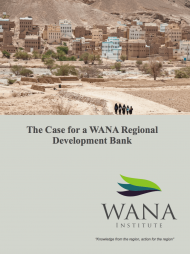-
The Case for a WANA Regional Development Bank
The Case for a WANA Regional Development Bank
New and better solutions are needed to respond to the economic challenges that are affecting the West Asia- North Africa (WANA) region and potentially maintaining it in a conflict trap. These solutions must evolve from the region itself, both for sustainability and to galvanise the political will necessary for needed policy changes to take hold. The good news is that region does have the capacity to resolve its economic challenges; resources are simply under-tapped and poorly managed. First, the massive foreign reserves accumulated by oil- exporting Gulf States could be better channeled into development projects in resource-scare and conflict- affected countries to raise economic activity and create jobs. Second, public-private partnerships could serve as a vehicle to for governments to obtain much-needed infrastructure without raising taxation or utilising other public funds, and promote engagement by the private sector in the region’s development agenda. Third, despite its enormous potential, zakat has not been effectively used as a development tool. Instead, insufficient checks and balances to guard against corruption and distribution methodologies that prioritise charitable giving over sustainable and inclusive development have done more to entrench poverty traps than solve them. Gulf finance, public-private partnerships and zakat might be brought together in a Regional Development Bank operating on the economic principles of integration, comparative advantage and specialisation to deliver new economic opportunities. Such a Bank would not only finance development projects, but also initiatives to promote resilience, social cohesion and conflict avoidance. The Bank would also act as a hub of critical analysis on development theory specific to the region to guide loan making, investments and projects. This paper makes the case for a regional development bank, outlines its constitutive elements and presents a series of next steps for realising the Bank concept.

